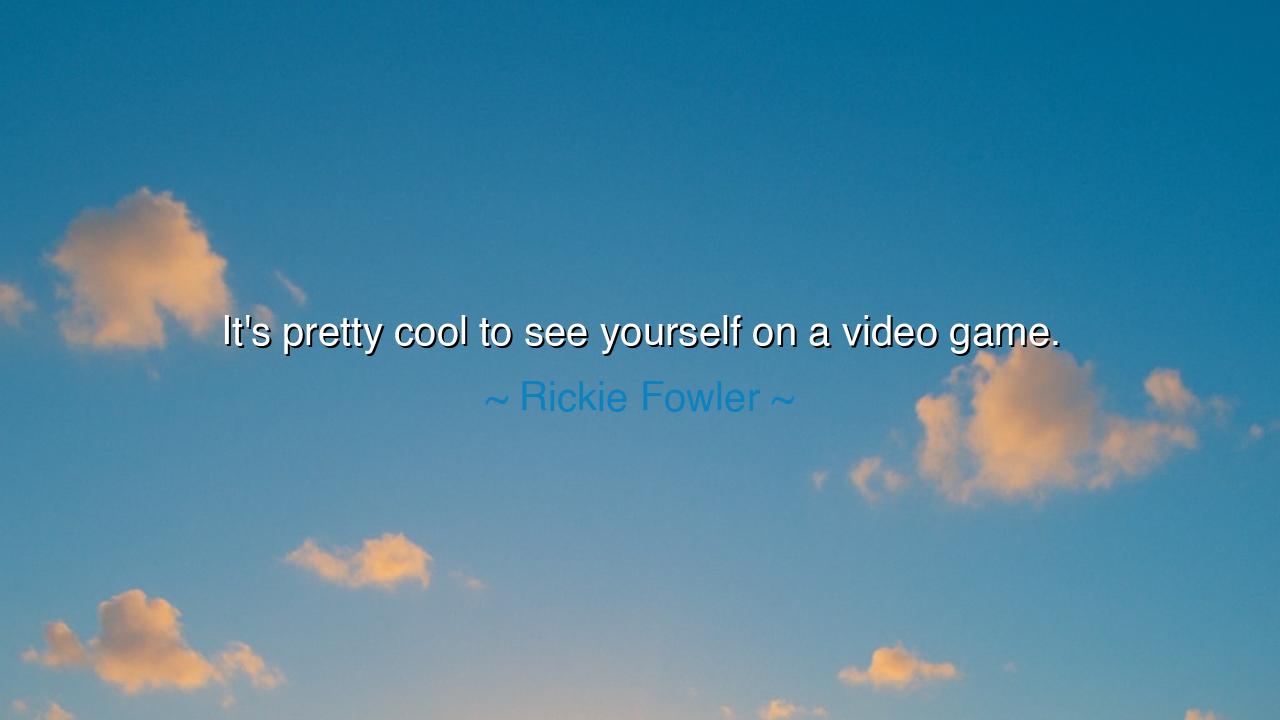
It's pretty cool to see yourself on a video game.






"It's pretty cool to see yourself on a video game." With these words, Rickie Fowler, the renowned golfer, touches upon an extraordinary moment—a moment where the boundary between the virtual and the real blurs, where the achievements of an individual transcend the physical world and are immortalized in the digital realm. To be placed within a video game, to become a character in an interactive experience, is a modern reflection of immortality and recognition, and it speaks to a deeper truth about human nature and our longing for legacy.
In the age of the ancient world, the idea of immortalization was deeply cherished. The Greeks, for example, believed that the greatest heroes were those who achieved not just greatness in battle or wisdom, but those who had their stories told through epic poetry or myth. Homer’s Iliad immortalized the deeds of Achilles and Hector, heroes who lived on in the stories passed down through the ages. For these ancient warriors, it was not just their triumphs that mattered, but the legacy they left behind. Today, the realm of video games offers a modern counterpart—an arena where one’s likeness, talent, and achievements are frozen in time, playable and remembered by future generations.
The video game as a medium represents something much more profound than mere entertainment. It is a space where individuals like Rickie Fowler are granted a form of immortality, where their image and abilities transcend the limitations of time and space. Just as ancient statues or paintings sought to capture the essence of a person, so too does the virtual world now serve as a canvas, where a person’s legacy is woven into a different type of history—one that is interactive, dynamic, and ever-evolving. This concept echoes the ancient Greek idea of the hero's journey, where the deeds of the hero were re-enacted through storytelling for future generations.
Consider, too, the example of Alexander the Great, whose legend became greater than his life. His image, his feats, his conquests were captured not only in sculptures but also in the annals of history, passed down through the works of historians like Plutarch and Arrian. These stories were meant to immortalize him, to ensure his name would never fade. In many ways, Fowler’s presence in a video game serves a similar function—an immortalization of his craft, but with an added layer of interactivity that allows players to engage with his persona in a more personal and meaningful way. The fact that his likeness is in a game speaks to the growing influence of modern legends who, in their unique ways, capture the imagination of the people.
Fowler’s statement also draws attention to the profound impact of technology on human experiences. Just as the ancient Egyptians used hieroglyphs to record their kings’ feats and ensure they were remembered for eternity, so too does technology allow us to preserve our actions, our character, and our legacies. Yet, where the ancient world offered stories carved in stone, today’s world provides a dynamic medium—video games, social media, and other forms of digital media allow a legacy to be constantly revisited and redefined.
But there is also a deeper reflection to be found in this moment of recognition. To see yourself in a video game, to feel the presence of your own image in this new form of media, is a reminder that greatness is often not defined by the accolades we receive, but by the impact we have on others. Fowler may be celebrated as a golfer, but his appearance in a video game invites players to engage with his legacy in ways that go beyond the green. It reminds us that the influence we have, the way we inspire and affect others, lives beyond the immediate confines of our profession.
In our own lives, we can learn from this concept of immortality and legacy. It is not enough to simply live for ourselves, but we must strive to leave a lasting impact—one that extends into the lives of others. Whether through our work, our words, or the simple acts of kindness we offer, each person has the potential to be immortalized in the hearts and minds of those who follow. Rickie Fowler’s reflection serves as a reminder that our actions, our presence, and our contributions can transcend time and space, that they can become part of a larger, ever-evolving story that continues to inspire.
So, as we journey through life, let us focus not just on the immediate rewards, but on the legacy we are creating. The virtual world may offer new ways to be remembered, but true immortality is found in the impact we have on the world around us. Be it through our work, our relationships, or our art, the most profound way to live is to leave a mark that will continue to inspire long after we are gone. Just as the ancient heroes live on in the stories passed down through generations, so too can we leave our own legacy for the future.






AAdministratorAdministrator
Welcome, honored guests. Please leave a comment, we will respond soon